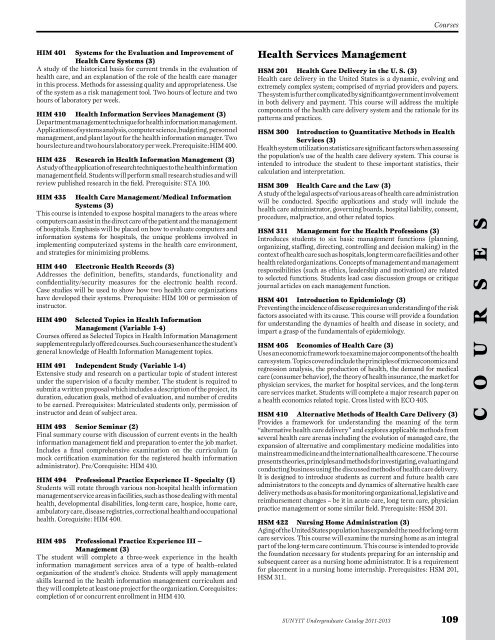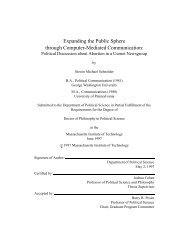Undergraduate Catalog 2011-2013 - SUNY Institute of Technology
Undergraduate Catalog 2011-2013 - SUNY Institute of Technology
Undergraduate Catalog 2011-2013 - SUNY Institute of Technology
You also want an ePaper? Increase the reach of your titles
YUMPU automatically turns print PDFs into web optimized ePapers that Google loves.
Courses<br />
HIM 401 Systems for the Evaluation and Improvement <strong>of</strong><br />
Health Care Systems (3)<br />
A study <strong>of</strong> the historical basis for current trends in the evaluation <strong>of</strong><br />
health care, and an explanation <strong>of</strong> the role <strong>of</strong> the health care manager<br />
in this process. Methods for assessing quality and appropriateness. Use<br />
<strong>of</strong> the system as a risk management tool. Two hours <strong>of</strong> lecture and two<br />
hours <strong>of</strong> laboratory per week.<br />
HIM 410 Health Information Services Management (3)<br />
Department management technique for health information management.<br />
Applications <strong>of</strong> systems analysis, computer science, budgeting, personnel<br />
management, and plant layout for the health information manager. Two<br />
hours lecture and two hours laboratory per week. Prerequisite: HIM 400.<br />
HIM 425 Research in Health Information Management (3)<br />
A study <strong>of</strong> the application <strong>of</strong> research techniques to the health information<br />
management field. Students will perform small research studies and will<br />
review published research in the field. Prerequisite: STA 100.<br />
HIM 435 Health Care Management/Medical Information<br />
Systems (3)<br />
This course is intended to expose hospital managers to the areas where<br />
computers can assist in the direct care <strong>of</strong> the patient and the management<br />
<strong>of</strong> hospitals. Emphasis will be placed on how to evaluate computers and<br />
information systems for hospitals, the unique problems involved in<br />
implementing computerized systems in the health care environment,<br />
and strategies for minimizing problems.<br />
HIM 440 Electronic Health Records (3)<br />
Addresses the definition, benefits, standards, functionality and<br />
confidentiality/security measures for the electronic health record.<br />
Case studies will be used to show how two health care organizations<br />
have developed their systems. Prerequisite: HIM 100 or permission <strong>of</strong><br />
instructor.<br />
HIM 490 Selected Topics in Health Information<br />
Management (Variable 1-4)<br />
Courses <strong>of</strong>fered as Selected Topics in Health Information Management<br />
supplement regularly <strong>of</strong>fered courses. Such courses enhance the student’s<br />
general knowledge <strong>of</strong> Health Information Management topics.<br />
HIM 491 Independent Study (Variable 1‐4)<br />
Extensive study and research on a particular topic <strong>of</strong> student interest<br />
under the supervision <strong>of</strong> a faculty member. The student is required to<br />
submit a written proposal which includes a description <strong>of</strong> the project, its<br />
duration, education goals, method <strong>of</strong> evaluation, and number <strong>of</strong> credits<br />
to be earned. Prerequisites: Matriculated students only, permission <strong>of</strong><br />
instructor and dean <strong>of</strong> subject area.<br />
HIM 493 Senior Seminar (2)<br />
Final summary course with discussion <strong>of</strong> current events in the health<br />
information management field and preparation to enter the job market.<br />
Includes a final comprehensive examination on the curriculum (a<br />
mock certification examination for the registered health information<br />
administrator). Pre/Corequisite: HIM 410.<br />
HIM 494 Pr<strong>of</strong>essional Practice Experience II - Specialty (1)<br />
Students will rotate through various non-hospital health information<br />
management service areas in facilities, such as those dealing with mental<br />
health, developmental disabilities, long‐term care, hospice, home care,<br />
ambulatory care, disease registries, correctional health and occupational<br />
health. Corequisite: HIM 400.<br />
HIM 495 Pr<strong>of</strong>essional Practice Experience III –<br />
Management (3)<br />
The student will complete a three-week experience in the health<br />
information management services area <strong>of</strong> a type <strong>of</strong> health–related<br />
organization <strong>of</strong> the student’s choice. Students will apply management<br />
skills learned in the health information management curriculum and<br />
they will complete at least one project for the organization. Corequisites:<br />
completion <strong>of</strong> or concurrent enrollment in HIM 410.<br />
Health Services Management<br />
HSM 201 Health Care Delivery in the U. S. (3)<br />
Health care delivery in the United States is a dynamic, evolving and<br />
extremely complex system; comprised <strong>of</strong> myriad providers and payers.<br />
The system is further complicated by significant government involvement<br />
in both delivery and payment. This course will address the multiple<br />
components <strong>of</strong> the health care delivery system and the rationale for its<br />
patterns and practices.<br />
HSM 300 Introduction to Quantitative Methods in Health<br />
Services (3)<br />
Health system utilization statistics are significant factors when assessing<br />
the population’s use <strong>of</strong> the health care delivery system. This course is<br />
intended to introduce the student to these important statistics, their<br />
calculation and interpretation.<br />
HSM 309 Health Care and the Law (3)<br />
A study <strong>of</strong> the legal aspects <strong>of</strong> various areas <strong>of</strong> health care administration<br />
will be conducted. Specific applications and study will include the<br />
health care administrator, governing boards, hospital liability, consent,<br />
procedure, malpractice, and other related topics.<br />
HSM 311 Management for the Health Pr<strong>of</strong>essions (3)<br />
Introduces students to six basic management functions (planning,<br />
organizing, staffing, directing, controlling and decision making) in the<br />
context <strong>of</strong> health care such as hospitals, long term care facilities and other<br />
health related organizations. Concepts <strong>of</strong> management and management<br />
responsibilities (such as ethics, leadership and motivation) are related<br />
to selected functions. Students lead case discussion groups or critique<br />
journal articles on each management function.<br />
HSM 401 Introduction to Epidemiology (3)<br />
Preventing the incidence <strong>of</strong> disease requires an understanding <strong>of</strong> the risk<br />
factors associated with its cause. This course will provide a foundation<br />
for understanding the dynamics <strong>of</strong> health and disease in society, and<br />
impart a grasp <strong>of</strong> the fundamentals <strong>of</strong> epidemiology.<br />
HSM 405 Economics <strong>of</strong> Health Care (3)<br />
Uses an economic framework to examine major components <strong>of</strong> the health<br />
care system. Topics covered include the principles <strong>of</strong> microeconomics and<br />
regression analysis, the production <strong>of</strong> health, the demand for medical<br />
care (consumer behavior), the theory <strong>of</strong> health insurance, the market for<br />
physician services, the market for hospital services, and the long-term<br />
care services market. Students will complete a major research paper on<br />
a health economics related topic. Cross listed with ECO 405.<br />
HSM 410 Alternative Methods <strong>of</strong> Health Care Delivery (3)<br />
Provides a framework for understanding the meaning <strong>of</strong> the term<br />
“alternative health care delivery” and explores applicable methods from<br />
several health care arenas including the evolution <strong>of</strong> managed care, the<br />
expansion <strong>of</strong> alternative and complimentary medicine modalities into<br />
mainstream medicine and the international health care scene. The course<br />
presents theories, principles and methods for investigating, evaluating and<br />
conducting business using the discussed methods <strong>of</strong> health care delivery.<br />
It is designed to introduce students as current and future health care<br />
administrators to the concepts and dynamics <strong>of</strong> alternative health care<br />
delivery methods as a basis for monitoring organizational, legislative and<br />
reimbursement changes – be it in acute care, long term care, physician<br />
practice management or some similar field. Prerequisite: HSM 201.<br />
HSM 422 Nursing Home Administration (3)<br />
Aging <strong>of</strong> the United States population has expanded the need for long‐term<br />
care services. This course will examine the nursing home as an integral<br />
part <strong>of</strong> the long‐term care continuum. This course is intended to provide<br />
the foundation necessary for students preparing for an internship and<br />
subsequent career as a nursing home administrator. It is a requirement<br />
for placement in a nursing home internship. Prerequisites: HSM 201,<br />
HSM 311.<br />
C O U R S E S<br />
<strong>SUNY</strong>IT <strong>Undergraduate</strong> <strong>Catalog</strong> <strong>2011</strong>-<strong>2013</strong> 109
















